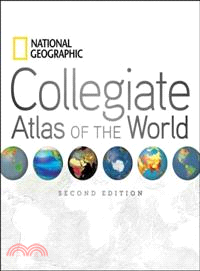Two opening spreads in the front matter help the reader to better interpret images and new data. "Remote World" introduces readers to data collection via remote sensing and GPS technology. "Understanding Our World Spatially" follows, covering data processing and analysis as it relates to mapping and using GIS technology (Geographic Information Systems). These explanatory introductory pieces provide the foundation for students to gain insight into modern-day map making, which is reflected in the content of the colorful, engaging, fact-filled spreads that lie ahead.
The atlas also addresses the traditional subjects of map scales, projections, and map reading skills. Based on feedback from more than 100 professors, educational reviewers, and other consultants, we have added special thematic map spreads addressing each Continental Economy. In addition—within each continent—physical, political, and regional mapping is presented at the same scale, which allows the reader to compare map information easily and accurately. This feature of a fixed scale for regions provides the reader the option to roam from one end of a continent to its other end, flipping through the pages, while maintaining a constant scale.
The atlas is organized as follows:
The Front matter with its new spreads on data collection and then data processing.
The World: with 25 spreads on Natural and Human themes including: Tectonics, the Biosphere, World Energy, World Health, Nutrition, and Literacy, and Technology and Globilization.
The atlas then zooms into Continental coverage:
Like the world thematic section, each of these continental parts will cover many important natural and human themes such as climate, natural hazards, income/GDP, and Trade. In addition, core political, regional coverage completes each continent's signature of human boundaries and places.
The fascinating polar regions and the vast world oceans come next.
Finally, abundant, clear, and precise appendices provide an invaluable back matter, reference section. A 105-page, place-name index is included as well.
Careful selection of place-names and features make the maps very informative but not overly cluttered. Computer-generated shading enhances the look of the political maps while providing valuable information on topography. The ocean floors of the world are dramatically portrayed with bathymetric relief paintings. And lastly, world political information, statistics, geographic comparisons, and glossaries are organized in easy-to-use sections in the back matter—all of this in a manageable, easy-to-handle, value-packed, 400-page, 9 x 11 format.
| FindBook |
有 1 項符合
National Geographic Collegiate Atlas of the World的圖書 |
 |
National Geographic Collegiate Atlas of the World 作者:National Geographic Society(U. S.) 出版社:Random House Inc 出版日期:2011-08-16 語言:英文 規格:24.1 x 28.6 x 3.2 cm / 普通級/ 雙色印刷 / 再版 |
| 圖書館借閱 |
| 國家圖書館 | 全國圖書書目資訊網 | 國立公共資訊圖書館 | 電子書服務平台 | MetaCat 跨館整合查詢 |
| 臺北市立圖書館 | 新北市立圖書館 | 基隆市公共圖書館 | 桃園市立圖書館 | 新竹縣公共圖書館 |
| 苗栗縣立圖書館 | 臺中市立圖書館 | 彰化縣公共圖書館 | 南投縣文化局 | 雲林縣公共圖書館 |
| 嘉義縣圖書館 | 臺南市立圖書館 | 高雄市立圖書館 | 屏東縣公共圖書館 | 宜蘭縣公共圖書館 |
| 花蓮縣文化局 | 臺東縣文化處 |
|
|
圖書介紹 - 資料來源:博客來 評分:
圖書名稱:National Geographic Collegiate Atlas of the World
|










